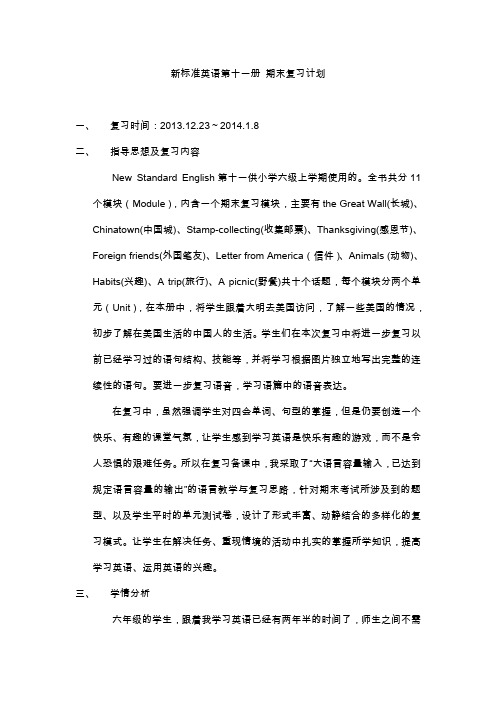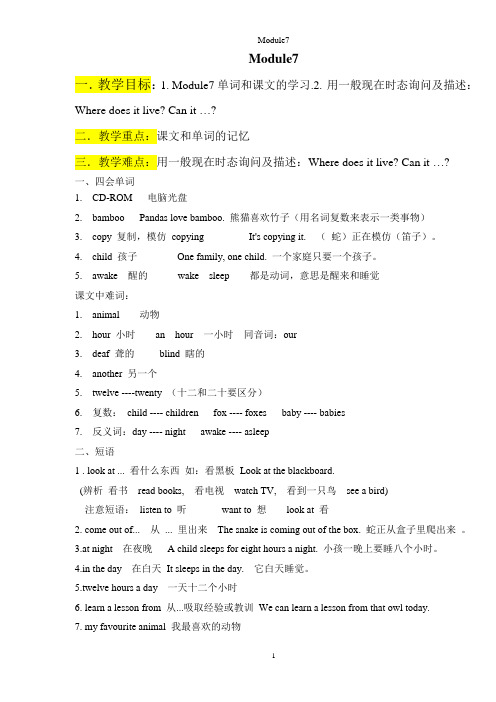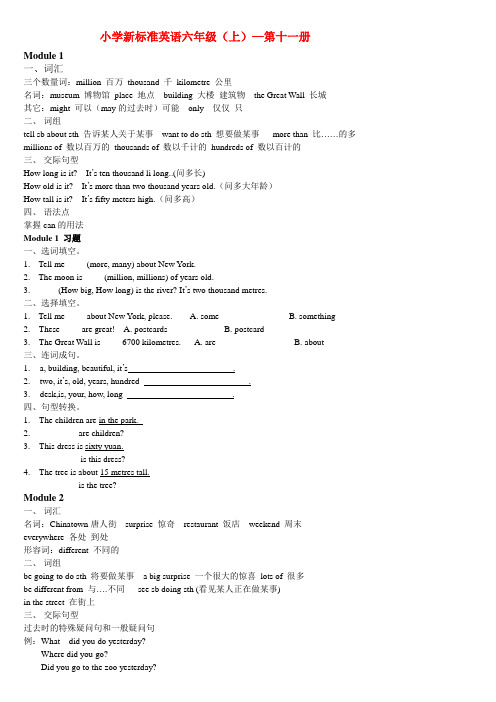新标准英语第十一册复习
- 格式:ppt
- 大小:510.00 KB
- 文档页数:4


新标准英语第十一册期末复习计划一、复习时间:2013.12.23~2014.1.8二、指导思想及复习内容New Standard English第十一供小学六级上学期使用的。
全书共分11个模块(Module),内含一个期末复习模块,主要有the Great Wall(长城)、Chinatown(中国城)、Stamp-collecting(收集邮票)、Thanksgiving(感恩节)、 Foreign friends(外国笔友)、Letter from America(信件)、Animals (动物)、Habits(兴趣)、A trip(旅行)、A picnic(野餐)共十个话题,每个模块分两个单元(Unit),在本册中,将学生跟着大明去美国访问,了解一些美国的情况,初步了解在美国生活的中国人的生活。
学生们在本次复习中将进一步复习以前已经学习过的语句结构、技能等,并将学习根据图片独立地写出完整的连续性的语句。
要进一步复习语音,学习语篇中的语音表达。
在复习中,虽然强调学生对四会单词、句型的掌握,但是仍要创造一个快乐、有趣的课堂气氛,让学生感到学习英语是快乐有趣的游戏,而不是令人恐惧的艰难任务。
所以在复习备课中,我采取了“大语言容量输入,已达到规定语言容量的输出”的语言教学与复习思路,针对期末考试所涉及到的题型、以及学生平时的单元测试卷,设计了形式丰富、动静结合的多样化的复习模式。
让学生在解决任务、重现情境的活动中扎实的掌握所学知识,提高学习英语、运用英语的兴趣。
三、学情分析六年级的学生,跟着我学习英语已经有两年半的时间了,师生之间不需要磨合,学生能够知道教师在复习阶段的要求,并且基本能够做到老师的要求,而我对学生也比较熟悉,知道每个学生的薄弱环节在哪个地方,可以进行有针对性的抓补。
但是,由于本学期并不是该班的班主任了,对于学生的平日学习习惯并不能时刻紧盯,部分后进生也因为老师不能随时进班而有所放松,对于这一部分学生应该抓紧。

Module7一.教学目标:1. Module7单词和课文的学习.2.用一般现在时态询问及描述:Where does it live? Can it …?二.教学重点:课文和单词的记忆三.教学难点:用一般现在时态询问及描述:Where does it live? Can it …?一、四会单词1. CD-ROM 电脑光盘2. bamboo Pandas love bamboo. 熊猫喜欢竹子(用名词复数来表示一类事物)3. copy 复制,模仿copying It's copying it. (蛇)正在模仿(笛子)。
4. child 孩子One family, one child. 一个家庭只要一个孩子。
5. awake 醒的wake sleep 都是动词,意思是醒来和睡觉课文中难词:1. animal 动物2. hour 小时an hour 一小时同音词:our3. deaf 聋的blind 瞎的4. another 另一个5. twelve ----twenty (十二和二十要区分)6. 复数:child ---- children fox ---- foxes baby ---- babies7. 反义词:day ---- night awake ---- asleep二、短语1 . look at ... 看什么东西如:看黑板Look at the blackboard.(辨析看书read books, 看电视watch TV, 看到一只鸟see a bird)注意短语:listen to 听want to 想look at 看2. come out of... 从... 里出来The snake is coming out of the box. 蛇正从盒子里爬出来。
3.at night 在夜晚 A child sleeps for eight hours a night. 小孩一晚上要睡八个小时。

新标准小学英语第十一册New Standard Primary School English Book 11。
Unit 1。
In Unit 1 of the New Standard Primary School English Book 11, students will learn about the topic of "My School Life". This unit focuses on introducing school-related vocabulary, such as classroom, teacher, classmates, and school subjects. It also includes simple sentences and conversations to help students communicate about their school life in English.The unit starts with a warm-up activity to engage students and get them thinking about their own school life. This could include asking students to talk about their favorite subjects, their best friends at school, or their favorite activities during break time. By starting with a personal connection, students are more likely to be motivated and interested in the following lessons.Following the warm-up, the unit introduces new vocabulary and phrases related to school life. This could be done through visual aids, such as flashcards or pictures, to help students understand and remember the new words. Teachers can also use real-life objects, such as a pencil, a book, or a ruler, to make the learning experience more interactive and practical.After introducing the new vocabulary, the unit provides simple sentences and conversations for students to practice using the new words in context. This could be done through role-plays, pair work, or group discussions, allowing students to actively use the language in a meaningful way. By providing opportunities for speaking and listening practice, students can improve their communication skills and gain confidence in using English.To reinforce the new learning, the unit includes various activities and exercises for students to complete. These activities could include matching exercises, fill-in-the-blankexercises, or writing short paragraphs about their own school life. By engaging in different types of activities, students can review and consolidate their understanding of the new vocabulary and grammar structures.Finally, the unit concludes with a review section to assess students' learning. This could be done through a quiz, a game, or a group competition to test students' understanding of the unit's content. By incorporating a fun and interactive review, teachers can ensure that students have grasped the key concepts and are ready to move on to the next unit.In conclusion, Unit 1 of the New Standard Primary School English Book 11 provides a comprehensive and engaging approach to teaching students about "My School Life". By incorporating various activities, exercises, and assessments, teachers can effectively help students learn and use English in a meaningful and practical way. This unit sets a solid foundation for students to continue building their English language skills in the following units.。

小学新标准英语六年级(上)—第十一册Module 1一、词汇三个数量词:million 百万thousand 千kilometre 公里名词:museum 博物馆place 地点building 大楼建筑物the Great Wall 长城其它:might 可以(may的过去时)可能only 仅仅只二、词组tell sb about sth 告诉某人关于某事want to do sth 想要做某事more than 比……的多millions of 数以百万的thousands of 数以千计的hundreds of 数以百计的三、交际句型How long is it? It’s ten thousand li long..(问多长)How old is it? It’s more than two thousand years old.(问多大年龄)How tall is it? It’s fifty meters high.(问多高)四、语法点掌握can的用法Module 1 习题一、选词填空。
1.Tell me ____ (more, many) about New York.2.The moon is ____ (million, millions) of years old.3.____ (How big, How long) is the river? It’s two thousand metres.二、选择填空。
1.Tell me ____ about New York, please. A. some B. something2. These ____ are great! A. postcards B. postcard3. The Great Wall is ____ 6700 kilometres. A. are B. about三、连词成句。
1.a, building, beautiful, it’s .2.two, it’s, old, years, hundred .3.desk,is, your, how, long .四、句型转换。

小学新标准英语第十一册Unit 1 Our School Life。
In Unit 1, we will learn about our school life. We will talk about the subjects we study, the activities we do, and the things we like about our school.First, let's talk about the subjects we study. In our school, we study English, Math, Science, Chinese, and Art. English is my favorite subject because I like learning new words and speaking in English. What is your favorite subject?Next, we will discuss the activities we do in school. We have P.E. class every Tuesday and Thursday. We also have music class every Friday. I enjoy playing sports and singing in music class. What activities do you enjoy in school?Finally, we will talk about the things we like about our school. I like the playground because I can play with my friends during recess. I also like the library because I can borrow interesting books to read. What do you like about your school?In conclusion, our school life is full of fun and learning. We study different subjects, participate in various activities, and enjoy the things our school has to offer. I am proud of my school and I hope you are proud of yours too.Unit 2 My Family。
小学英语教学评价标准外研社一起点六年级十一册一、语音1. 复习辅音字母、元音字母的拼读规律。
2. 复习巩固句子语调、单词重音、句子重读。
二、词汇1. 能听说读写下列单词(30)bring拿来,带来city 城市difficult困难的hear听到,听见often常常,经常place 地方,地点week星期,周way方式,方法America美国Canada 加拿大copy模仿child孩子different 不同的dancing舞蹈finish完成,结束kilometre公里line排,列million百万,百万个present礼物pen pal笔友pretty漂亮的surprise惊奇stamp邮票special特殊的,特别的thousand一千,一千个together一起tidy整理,收拾thirsty口渴的weekend周末world 世界2.能听说读下列单词(54)American美国人around周围Australia澳大利亚build建造,建筑Chinatown 唐人街Christmas圣诞节fantastic奇妙的,极好的favorite 最喜欢的festival节日finger手指forget忘记important重要的inside 里面island岛屿lesson 教训messy 肮脏的,凌乱的meter米more更多museum 博物馆need 需要的noise噪音parrot 鹦鹉picnic 野餐sandwich 三明治street街道than 比UN 联合国address地址album集邮册answer回答awake醒的building建筑物,大楼bamboo竹子bookshelf书架collect收集coconut椰子chopsticks(复)筷子choose选择CD-ROM电脑光盘everywhere各处,到处foreign外国的kangaroo袋鼠might可能,可以nearly几乎,差不多pleased 高兴的,满足的peace和平restaurant 饭馆3. 识别单词(12个)suck 吸thumb 拇指tomb坟墓fair 集市simple 简单的,天真的money 钱indeed 的确,确实,真正地hang 悬挂better 更好alone 单独的,独自的owl 猫头鹰the Five-Finger Mountains五指山三、语法(句型)1. 学会运用how long/how old/ how tall等。
Module4一.教学目标:1. Module4单词和课文的学习.2.can you tell me …?句型的学习3.关于月份和节日单词的总结二.教学重点:课文和单词的记忆三.教学难点:can you tell me …?句型的学习一、单词十一册第四模块知识点:一、熟记并背诵:1. special2. hear3. nearly4. present5. together回顾与了解:1. festival2. Thanksgiving3.November4. poem5. something6. Christmas7. country ---- countries (复数)8. December9. card10.hang二重要的短语:1.about American festivals 关于美国的节日2. in November 在十一月3. a big, special dinner 一顿丰盛而有特殊意义的晚餐4. all the good things we have 我们所拥有的所有美好的事物5.a lot of fun 许多乐趣6. in America 在美国7. a poem about Thanksgiving 一首关于感恩节的诗8. every year 每年、年年9. a very important festival 一个非常重要的节日10. in many countries 在很多国家11. on the 25th of December 在12月25日12. put … in … 把……放进……13. in the streets 在街道上14. give presents / give a present 送礼物15. send cards / send a card 寄贺卡16. lots of things to see 很多可以看的东西17. climb a high mountain 爬高山18. swim in a lake 在湖里游泳19. outside the building 建筑物的外面20. all day and all night 整日整夜三、重点语法:1表示不具体、不确切的时间时用in:如:in + 年(in 2009)in + 季节(in autumn)in + 月(in September)2表示具体确切的某一天用on:如:on + 星期几(on Monday )on + 年月日(on 1st, 9, 2009 )3在表示具体的几点几分的时候用at: at nine 在九点4 区分:listen 和hear 都有听的意思,但是listen强调听的动作,hear 强调听的结果—“听到”四相关知识了解:1一年十二个月份:January February March April May June July August September October November December2、中国传统节日:Spring Festival / Chinese New Year 春节(阴历一月一日)The Lantern Festival 元宵节(阴历一月十五)Tomb-sweeping Day 清明节(4月5日左右)Dragon Boat Festival 端午节/ 龙舟节(阴历五月五日)Mid-autumn Festival / Moon Festival 中秋节(阴历八月十五)Double Ninth Day 重阳节(阴历九月九日)3、西方传统节日:Easter 复活节(春分月圆后的第一个周日)April Fool’s Day 愚人节(四月一日)Mother’s Day 母亲节(五月的第二个周日)Father’s Day 父亲节(六月的第三个周日)Thanksgiving 感恩节(十一月的第四个星期四)Halloween 万圣节(十月三十一日)Christmas 圣诞节(十二月二十五日)五.图片讲解ThanksgivingChristmas练习一、写出下列单词和短语。
Module eight一单词Tidy 整理打扫 often 经常bookshelf书架choose选择messy 凌乱的idea 主意together 一起story故事brother 兄弟library 图书馆help 帮助week 周weekend 周末want 想要词组!好主意 read story 讲故事suck your thumb 吮手指 at the week end 在周末tidy one ′s room 打扫某人房间tidy your room打扫你的房间read book 读书go to the library 去图书馆go swimming 游泳want to do sth 想要做某事How often多久一次ice cyeam 冰激凌watche TV 看电视交际句型Do you often tidy your room?It’s very messy.What do you want to do?语法掌握often等频率副词的用法重点句子Do you often read books ?你经常读书吗?Do you often go to the library ?你经常去图书馆吗?What are you doing ?你正在做什么?I am tiding my room .我正在整理我的房间We can play well in a tidy room .我们会在一个整齐的房间里玩得很好Do you often tidy your bookshelf ?你经常整理你的书架吗?No ,I don′t . It′s very messy .不,我没有,它很凌乱。
I often help my dad我经常帮助爸爸I often go swimming我经常去游泳What do you do well ?你什么做的较好?(你擅长什么)I swim very well我擅长游泳How often do you swim?你游泳多久一次?I swim evry week.我每周游泳Does Amy ofen tidy her bookshelf ?艾米经常整理她的书架吗?What does Amy want to do ?艾米想去做什么?She wants to tidy her room .他想去整理房间He often reads books.他经常读书He doesn′t ofen eat ice cyeams他不常吃冰激凌He often cleans his romm .他经常打扫他的房间He doesn′t ofen play computer games他不常玩电脑游戏He often watches TV他经常看电视Module 8 习题一、英汉互译。